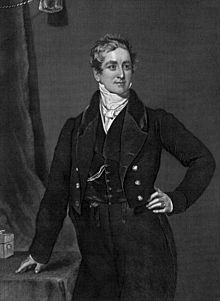Robert Peel
Sir Robert Peel (5 February 1788 – 2 July 1850) was a British politician. He established many well-known laws in Britain including the police force,[1] and had a brief term as Prime Minister.
The Rt Hon Sir Robert Peel, Bt | |
|---|---|
 | |
| Prime Minister of the United Kingdom | |
| In office 10 December 1834 – 8 April 1835 30 August 1841–29 June 1846 | |
| Preceded by | The Viscount Melbourne |
| Succeeded by | The Viscount Melbourne The Lord John Russell |
| Chancellor of the Exchequer | |
| In office 2 December 1834 – 8 April 1835 | |
| Preceded by | Thomas Denman |
| Succeeded by | Thomas Spring Rice |
| Personal details | |
| Born | 5 February 1788 Bury, Lancashire |
| Died | 2 July 1850 (aged 62) Westminster |
| Political party | Conservative |
In 1834, he founded the Conservative Party out of the old Tory party which was founded in 1678. Peel was a very clever politician in his own right. However, he went against his party in 1846 by repealing the Corn Laws. After this the party split and were not in power for the next 28 years.
In 1835 he published the Tamworth Manifesto, which told people how he wanted the government to be run. He came to power in 1841, defeating the Whig government of Lord Melbourne, and ruled the country until 1846. During this time, Peel's popularity with other party members became lower because many of them thought he was too proud, and disliked the way he changed his mind over some important issues, often without telling them first. The defeat of his Conservative Party in 1846 was followed by a brief period in the House of Commons until his death in 1851, in a horse riding accident.[2]
Peel is one of the famous people who appears on the cover of The Beatles Sgt. Pepper's Lonely Hearts Club Band album.
Main Achievements
Sir Robert Peel is most famous for creating the British Police Force. Early police men were sometimes called "Peelers" because he created them. He was born in Bury, 1788 - the town he was born in is so proud of him they built him a tower on Holcombe hill. [1] Archived 2023-01-31 at the Wayback Machine
References
change- ↑ Lentz, Susan A.; Smith, Robert H.; Chaires, R.A. (2007). "The invention of Peel's principles: A study of policing 'textbook' history". Journal of Criminal Justice. 35: 69–79. doi:10.1016/j.jcrimjus.2006.11.016.
- ↑ Gaunt, Richard A. 2010. Sir Robert Peel: the life and legacy. IB Tauris.